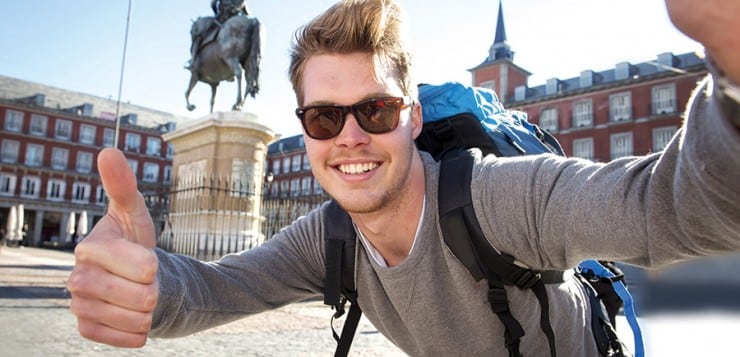Being an international student means so much more than gaining knowledge in another country: it means exploring countries and gaining invaluable experience, culture shock upon arrival to another country, as well as when you come back home. It means meeting new people, trying new food, travelling as far as you can see, and also surviving on a tight student budget.
While studying in Europe, you will have to spend money on everything you never thought you would have to pay for, starting with a fork and spoon and ending with buying a mattress. With the basics covered, you will surely think of travelling around the continent and although it may seem expensive, it is a one-time opportunity you simply have to do.
Studying in two of the most expensive cities in Spain – Madrid and Barcelona – I learned a lot of tricks that helped me survive through my college, and also have a lot of fun. For those who are about to study in Spain or elsewhere in Europe, I prepared a list of top budget tips for foreign students in Europe. Read on.
1. Plan transportation ahead
Europe is one of those places where travelling seems so easy or even obligatory, with so many interesting countries being so close and easy to get to. The key tip to travelling throughout Europe is planning things ahead, meaning three to six months. Book your budget airlines ahead, as you can often save about half of the price. The cheapest airlines in Europe are Spanish Vueling, British Easyjet, and Irish Ryanair. You can buy a ticket from Spain to Italy for as little as 17 Euros! Don’t forget about trains, as Europe has an excellent train system that will take you almost anywhere you wish to go, plus they are very cheap, especially if you use your student ID or a city card.
2. Know your budget and the current exchange rates
When travelling on a budget, make sure to check the current exchange rate or, better yet, download an app that will do the math for you. Remember that it is never a good idea to exchange currency from a stranger, even the nicest one. There are special legal places where you can do it – exchange booths and banks – so shop for the best rates if you can, and the lowest commissions.
3. Join student travel groups
There are numerous student travel groups, but the best in my experience were International Tourist Travel Club and International Friends. The benefits that come from joining these groups are countless. Not only are some trips subsidized, but you can also get to know a lot of new people from around the world, participate in free guided tours, get free or very cheap accommodation, and count on institutional support.
4. Look for discounts
Europe has excellent student discount systems. Each major city has a city discount card that allows you to save up to 50% on accommodation, transport, entry fees, and even food. City cards are usually pretty cheap, they last from one to five days, and give you endless possibilities you wouldn’t afford on your own. For example, you can visit the world famous Prado Museum in Madrid, which costs about 20 Euros, for free and save on transportation throughout the city. You can also look for cafés and bars listed on discount cards and eat there half price.
5. Be open-minded about accommodation
Accommodation might be one of the biggest expenses during your travelling. To save money, you will have to think outside the box. Places like most hotels are out of the question during budget travelling. Hostels used to be the cheapest places to stay in Europe and are still an option. Plus, it allows you to meet new people that could possibly become your travel partners.
Another option is to try couchsurfing, a relatively new model of accommodation whereby people apply to stay in houses with people willing to host travellers. This option is 100% free and the service is now widely-known. Be careful when choosing this service, and make sure you are being introduced to your prospective hosts through a reputable service provider. Read the reviews before you book.
6. Do as the locals do
Follow people in their everyday habits, because it exposes you to the real culture and traditions and because locals tend to do everything cheaper than tourists. Try to stay in the local area, see which places they prefer to shop at and go out to. Ask the locals what kind of pubs they like and the cheapest way to get to a famous sightseeing spot. Wherever you are in Europe, you will see that locals do not always stay in the downtown area and moreover, don’t eat in fancy restaurants daily. Waiters are also a great help, even if they are not from the area. Most of them are kind enough to tell you how to get around and which places to visit.
7. Drive away
As mentioned earlier, European countries are very close to each other and sometimes it is cheaper and faster to rent a car instead of taking a train. If you want to visit famous little villages in France or Germany, for example, renting a car may be the best option. This way you will save some pocket money and enjoy incredible landscapes. And go with your new friends and share the cost of the rental and gas, making it a cheap and fun road trip for all of you.
8. Buy a phrase book
If you think all people in Europe speak English then you couldn’t be more wrong. You can typically find English-speaking locals in major cities, but if you go to the countryside, then you may be on your own. Plus, it wins you a lot of favour with locals to at least be trying to communicate in the local language.
9. City-hop
City-hop is a popular term among student travellers. Having little time and money to spare, it allows you to visit several places without having to pay for accommodation and basic services. You can sleep on trains and eat on the go. Of course, city-hopping is not appropriate for such giant cities like London or Rome, where two weeks won’t be enough to see everything. But when going through little towns in Belgium or the Netherlands, for example, this is quite an attractive option.
10. Pack lightly
When studying in Europe, you will notice that most people wear light casual clothes with cute accessories. When travelling, you have to take only the most necessary items and if you think you have packed lightly, think again. There is always something you can leave in your dorm/home. You may want to buy souvenirs or a little something to remember the trip by, so prepare to have some extra room in your backpack. As well, travelling light will not only save you from having to lug around heavy bags, but will save you money, as often extra charges apply for oversized bags in trains and planes.
11. Socialize as a local
Or better with. Local students always know the best places to socialize and just like you, they have limited budgets. Try new things with locals if you can, like favourite food kiosks and entertainment venues. Go to little music clubs in Milan and dance a night away in the oldest dance hall in Barcelona. There are unlimited places you can visit, and usually the best places are hidden from a regular tourist.
12. Have fun!
Contributed by:
Rachel Fowler
Rachel Fowler has lived and studied in Barcelona and Madrid, on and off for two years. She enjoys travelling and writing and currently works as a part-time contributor for College-Writers.com






Discussion3 Comments
If you are a legal US citizen, you have an excellent opportunity to win a $5000 gift card by participating in the Home Depot’s customer survey Sweepstakes. Take the official survey at https://www.homedepotsurvey.co/ now and rate your satisfaction.
Thanks for sharing your insights Rachel. Embracing local habits truly enhanced my European experience and saved me some serious cash. City hopping was a game changer for squeezing the most out of my travel budget.
Pool Resurfacing in Whitefish MT
Uniswift, your premier multi-sports store, offers top-quality boxing bag designed for durability and peak performance. Ideal for all training levels, our boxing bags withstand intense workouts, enhancing your strength and technique. Trust Uniswift to provide the best gear for your boxing and fitness needs.